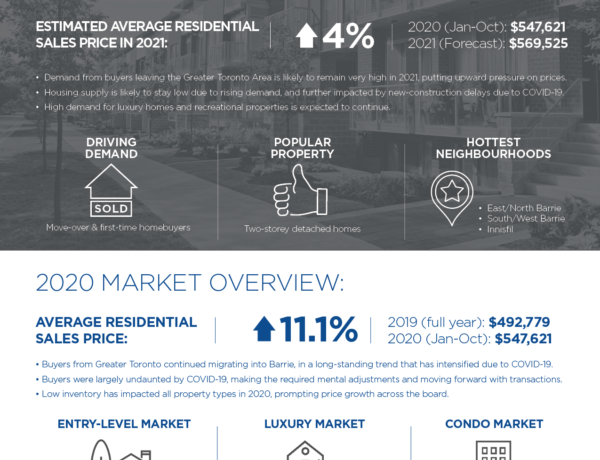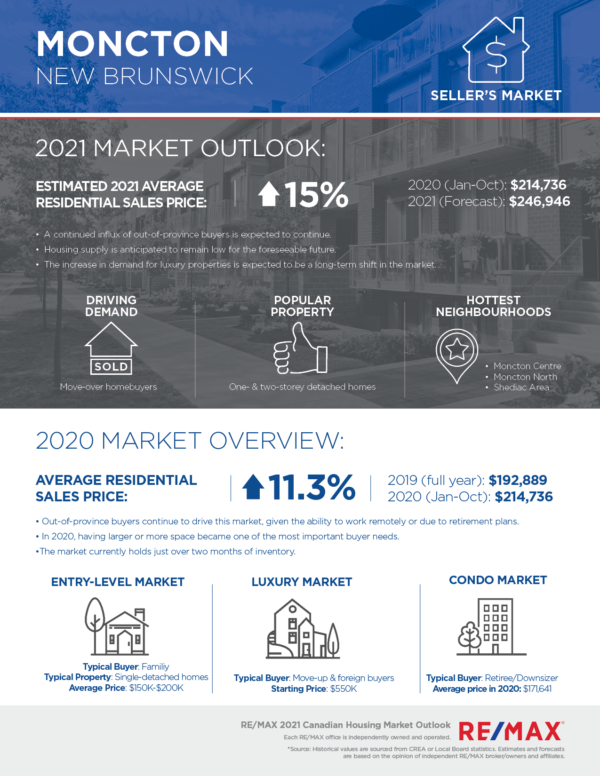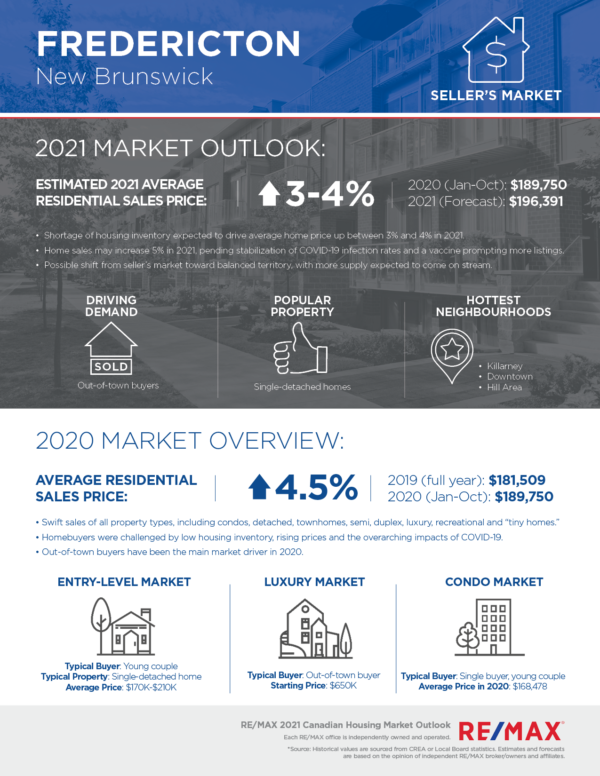.
The average sale price in the Simcoe County housing market increased by 5.1 per cent between 2022 and 2023 (from $927,780 in 2022 to $974,831 in 2023), while the number of sales decreased by 12.5 per cent (from 2,067 from 2022 to 1,809 in 2023). The current housing market in Simcoe County is a seller’s market, which is anticipated to shift to a balanced market heading into 2024 due to softer sales with an increase in inventory – with average residential sale price predicted to increase by seven per cent, and unit sales to increase by 10 per cent in the year ahead, as a result of pent up demand from buyers moving to the sidelines waiting for interest rates to stabilize.
It is expected that the top three sought-after neighbourhoods in 2024 in Simcoe County will be Leticia Heights, Allendale and Innisfil. Liveability trends pinpoint that greenspace, and large lots are fueling demand and sales activity for single detached homes, in addition to shared mortgages because of the need for entry-level buyers to offset increased carrying costs on their mortgages, which will continue to be the case heading into 2024. The dominant factors impacting local housing market conditions in Simcoe County are interest rates and low inventory. Both are causing more individuals to explore the rental market, therefore, widening the gap between buyers and sellers, as realtors are forced to manage expectations and revise pricing.
“High interest rates continue to dictate market activity across Canada including in Simcoe County. We’re seeing first-time home buyers be priced out of the market as a result, especially if they’re looking to purchase homes without any financial support,” says David Brown, Manager and Sales Representative, RE/MAX Hallmark Chay Realty. “Not to mention demand is currently high due to low inventory levels – which won’t be rectified any time soon as developers are pausing projects due to economy uncertainty.”
Top Trends:
- Simcoe County will shift from a buyer’s market into a balanced market in 2024.
- Single-detached homes are likely to see the greatest demand in this region.
- First-time homebuyers are being priced out of market unless there’s supplementary financial support from parents.
- First-time homebuyers are also exploring taking in tenants to ensure mortgage payments are fulfilled, as high interest rates continue to control market activity.
- In the luxury segment, high net-worth individuals and families are purchasing properties upwards of $2,500,000. Developers in Midhurst, Innisfil, and Alliston are pulling back on projects due to economic uncertainty.
______
About the RE/MAX Network
As one of the leading global real estate franchisors, RE/MAX, LLC is a subsidiary of RE/MAX Holdings (NYSE: RMAX) with more than 140,000 agents in almost 9,000 offices with a presence in more than 110 countries and territories. RE/MAX Canada refers to RE/MAX of Western Canada (1998), LLC and RE/MAX Ontario-Atlantic Canada, Inc., and RE/MAX Promotions, Inc., each of which are affiliates of RE/MAX, LLC. Nobody in the world sells more real estate than RE/MAX, as measured by residential transaction sides.
RE/MAX was founded in 1973 by Dave and Gail Liniger, with an innovative, entrepreneurial culture affording its agents and franchisees the flexibility to operate their businesses with great independence. RE/MAX agents have lived, worked and served in their local communities for decades, raising millions of dollars every year for Children’s Miracle Network Hospitals® and other charities. To learn more about RE/MAX, to search home listings or find an agent in your community, please visit remax.ca. For the latest news from RE/MAX Canada, please visit blog.remax.ca.
Forward looking statements
This report includes “forward-looking statements” within the meaning of the “safe harbour” provisions of the United States Private Securities Litigation Reform Act of 1995. Forward-looking statements may be identified by the use of words such as “believe,” “intend,” “expect,” “estimate,” “plan,” “outlook,” “project,” and other similar words and expressions that predict or indicate future events or trends that are not statements of historical matters. These forward-looking statements include statements regarding housing market conditions and the Company’s results of operations, performance and growth. Forward-looking statements should not be read as guarantees of future performance or results. Forward-looking statements are based on information available at the time those statements are made and/or management’s good faith belief as of that time with respect to future events and are subject to risks and uncertainties that could cause actual performance or results to differ materially from those expressed in or suggested by the forward-looking statements. These risks and uncertainties include (1) the global COVID-19 pandemic, which has impacted the Company and continues to pose significant and widespread risks to the Company’s business, the Company’s ability to successfully close the anticipated reacquisition and to integrate the reacquired regions into its business, (3) changes in the real estate market or interest rates and availability of financing, (4) changes in business and economic activity in general, (5) the Company’s ability to attract and retain quality franchisees, (6) the Company’s franchisees’ ability to recruit and retain real estate agents and mortgage loan originators, (7) changes in laws and regulations, (8) the Company’s ability to enhance, market, and protect the RE/MAX and Motto Mortgage brands, (9) the Company’s ability to implement its technology initiatives, and (10) fluctuations in foreign currency exchange rates, and those risks and uncertainties described in the sections entitled “Risk Factors” and “Management’s Discussion and Analysis of Financial Condition and Results of Operations” in the most recent Annual Report on Form 10-K and Quarterly Reports on Form 10-Q filed with the Securities and Exchange Commission (“SEC”) and similar disclosures in subsequent periodic and current reports filed with the SEC, which are available on the investor relations page of the Company’s website at www.remax.com and on the SEC website at www.sec.gov. Readers are cautioned not to place undue reliance on forward-looking statements, which speak only as of the date on which they are made. Except as required by law, the Company does not intend, and undertakes no duty, to update this information to reflect future events or circumstances.
ARCHIVE
The post Simcoe County Housing Market Outlook (2024) appeared first on RE/MAX Canada.




 From a national perspective, RE/MAX anticipates a leveling out of the highs and lows that characterized the Canadian housing market in 2019, particularly in Vancouver and Toronto, as we move into 2020. Healthy price increases are expected, with an estimated 3.7-per-cent increase in the average national residential sales price, according to the
From a national perspective, RE/MAX anticipates a leveling out of the highs and lows that characterized the Canadian housing market in 2019, particularly in Vancouver and Toronto, as we move into 2020. Healthy price increases are expected, with an estimated 3.7-per-cent increase in the average national residential sales price, according to the 
